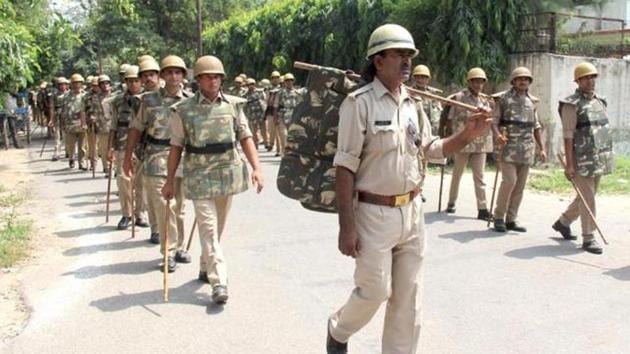
The Bastar police on Monday arrested seven people from Andhra Pradesh inside the Chhattisgarh border in Sukma district and claimed that they belonged to intellectual wings of Maoists outfits.

Police said they seized four motorcycles they were riding, demonetized currency with face value of Rs 1 lakh, mobile phones and Maoist literature from their possession.
All the arrested people were presented before a court after registering an FIR at Konta police station of Sukma district. The court sent them to judicial custody.
“The accused were found with old currency notes and some important Naxal-related documents. They were arrested and booked and were produced in court,” said Indira Kalyan Elesela, SP of Sukma said.
Elsela said those arrested included social activist Durga Prasad (36) of Hydrabad, R. Laxmaiyya (45), secretary of Adiwasi Tudem Dubba, Khammam, journalists B. Prabhakar Rao (52) and Rajendra Prasad (28) from Hyderabad, high court advocates Ch Prabhakar Rao (48) and B. Ravindra Nath (42) Hyderabad and Mohammad Nazim (27), research scholar Osmania University.
One of the arrested people - Ch. Prabhakar said the police action was unwarranted because they were only civilians.
Police claimed that the both the journalists used to instigate the people while the advocates had enlarged support to the Maoists in encounters and the research scholar was propagating Maoist line of thinking.
The seven men were booked under the Chhattisgarh Public Security Act (CSPA).
The accused claimed they were rights activists on a fact-finding mission related to encounters and atrocities in Maoist-affected areas of Telangana and Chhattisgarh.
Civil rights activists have slammed the police for the arrest.
“They left Hyderabad on December 24 and were detained on December 25 in Telangana. Later, Telangana police handed over the team members to Chhattisgarh police. They were human right activists and the citizen of India and the charges framed against them are unconstitutional,” said N Narayandeo, general secretary of Civil Liberties Committee, Telangana.
He said the committee has called for a massive protest on Tuesday in Hyderabad.
What is CSPSA ?
Chhattisgarh Special Public Security Act, 2005 (CSPSA) was passed by the Chhattisgarh assembly in December 2005.
Activists allege that the act authorises police to detain a person for committing acts, which among other things, show a “tendency to pose an obstacle to the administration of law”. The act says that any person whose actions “encourage(s) the disobedience of the established law” will be considered “unlawful”.
Touchy cops
The Chhattisgarh Police has been extremely touchy about the foray of civil rights activists in the Maoist hit regions where allegations of rights abuse have been rife.
Journalists have been at the receiving end in Bastar for what activists say are persistent attempts by the local police to intimidate the media. Four local journalists have been arrested since last year while a visiting BBC newsman was forced to leave the district. Another was forced to flee the region after being accused of having Maoist links.
Early last month, the Chhattisgarh Police registered a murder case against Nandini Sundar, a Delhi University professor and others in Sukma on the complaint of the wife of a tribal who was killed on 4 November in Chhattisgarh.
Sundar rubbished the allegations of the police, while a number of civil rights bodies called the charges a tactic of “revenge and harassment”. The DU professor said it was a clear case of being “framed” and that police have been forcing some people in Bastar to name her and others in some way.
On November 12, the Chhattisgarh government assured the Supreme Court that it would not arrest Sundar and others after the apex court said it was inclined to stay the FIR registered against them in the case. Sundar has been working extensively in Maoist-hit regions like Bastar. On her petition, the Supreme Court had banned the state-backed anti-Maoist force Salwa Judum, calling it unconstitutional. She has also been highlighting situation of ordinary villagers in Bastar and other areas.